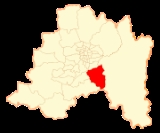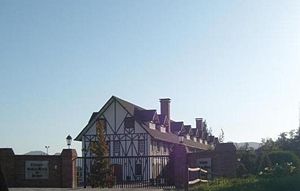
Pirque
Encyclopedia
Pirque is a commune of Chile
in Cordillera Province
, Santiago Metropolitan Region
; it is located 2.8 kilometers SE of Puente Alto
and 21.3 kilometers SSE of the center of Santiago
. It is situated in a mountain chain.
 According to the 2002 census
According to the 2002 census
of the National Statistics Institute
, Pirque spans an area of 445.3 sqkm and has 16,565 inhabitants (8,384 men and 8,181 women). Of these, 9,651 (58.3%) lived in urban area
s and 6,914 (41.7%) in rural areas. The population grew by 45.7% (5,197 persons) between the 1992 and 2002 censuses.
, headed by an alcalde
who is directly elected every four years.
Within the electoral divisions of Chile, Pirque is represented in the Chamber of Deputies
by Mr. Osvaldo Andrade (PS
) and Mr. Leopoldo Pérez (RN
) as part of the 29th electoral district, (together with Puente Alto
, San José de Maipo
and La Pintana
). The commune is represented in the Senate
by Soledad Alvear Valenzuela (PDC
) and Pablo Longueira Montes (UDI) as part of the 8th senatorial constituency (Santiago-East).
Chile
Chile ,officially the Republic of Chile , is a country in South America occupying a long, narrow coastal strip between the Andes mountains to the east and the Pacific Ocean to the west. It borders Peru to the north, Bolivia to the northeast, Argentina to the east, and the Drake Passage in the far...
in Cordillera Province
Cordillera Province, Chile
Cordillera Province is one of six provinces in the Santiago Metropolitan Region of central Chile. Its topography includes a small area of Chile's central valley, glaciers, rivers, volcanoes, and the Andes range, which forms the border with Argentina...
, Santiago Metropolitan Region
Santiago Metropolitan Region
Santiago Metropolitan Region or simply Metropolitan Region is one of Chile's 15 first order administrative divisions. It is the country's only landlocked administrative region and contains the nation's capital, Santiago...
; it is located 2.8 kilometers SE of Puente Alto
Puente Alto
Puente Alto is a city and commune of Chile. It is the capital of the Cordillera Province in the Santiago Metropolitan Region. Located at the south of the Greater Santiago conurbation, it houses 492,603 inhabitants , making it the largest city in Chile...
and 21.3 kilometers SSE of the center of Santiago
Santiago
Santiago is the capital city of Chile. Santiago may also refer to:*Santiago *Santiago , a Spanish given name*Santiago!, a shortened form of the Reconquista battle cry "Santiago y cierra, España"...
. It is situated in a mountain chain.
Demographics

Census
A census is the procedure of systematically acquiring and recording information about the members of a given population. It is a regularly occurring and official count of a particular population. The term is used mostly in connection with national population and housing censuses; other common...
of the National Statistics Institute
National Statistics Institute (Chile)
The National Statistics Institute of Chile is a state-run organization of the Government of Chile, created in the second half of the 19th century and tasked with performing a general census of population and housing, then collecting, producing and publishing official demographic statistics of...
, Pirque spans an area of 445.3 sqkm and has 16,565 inhabitants (8,384 men and 8,181 women). Of these, 9,651 (58.3%) lived in urban area
Urban area
An urban area is characterized by higher population density and vast human features in comparison to areas surrounding it. Urban areas may be cities, towns or conurbations, but the term is not commonly extended to rural settlements such as villages and hamlets.Urban areas are created and further...
s and 6,914 (41.7%) in rural areas. The population grew by 45.7% (5,197 persons) between the 1992 and 2002 censuses.
Stats
- Population: 20,518 (2006 projection)
- Average annual household income: US$21,537 (PPPPurchasing power parityIn economics, purchasing power parity is a condition between countries where an amount of money has the same purchasing power in different countries. The prices of the goods between the countries would only reflect the exchange rates...
, 2006) - Population below poverty line: 9.1% (2006)
Administration
As a commune, Pirque is a third-level administrative division of Chile administered by a municipal councilMunicipal council
A municipal council is the local government of a municipality. Specifically the term can refer to the institutions of various countries that can be translated by this term...
, headed by an alcalde
Alcalde
Alcalde , or Alcalde ordinario, is the traditional Spanish municipal magistrate, who had both judicial and administrative functions. An alcalde was, in the absence of a corregidor, the presiding officer of the Castilian cabildo and judge of first instance of a town...
who is directly elected every four years.
Within the electoral divisions of Chile, Pirque is represented in the Chamber of Deputies
Chamber of Deputies of Chile
The Chamber of Deputies of the Republic of Chile is the lower house of Chile's bicameral Congress. Its organisation and its powers and duties are defined in articles 42 to 59 of Chile's current constitution....
by Mr. Osvaldo Andrade (PS
Socialist Party of Chile
The Socialist Party of Chile is a political party, that is part of the center-left Coalition of Parties for Democracy coalition. Its historical leader was the late President of Chile Salvador Allende Gossens, who was deposed by General Pinochet in 1973...
) and Mr. Leopoldo Pérez (RN
National Renewal (Chile)
National Renewal , is a liberal conservative political party belonging to the Chilean right-wing political coalition Coalition for Change in conjunction with the Independent Democratic Union and the Chile First movement...
) as part of the 29th electoral district, (together with Puente Alto
Puente Alto
Puente Alto is a city and commune of Chile. It is the capital of the Cordillera Province in the Santiago Metropolitan Region. Located at the south of the Greater Santiago conurbation, it houses 492,603 inhabitants , making it the largest city in Chile...
, San José de Maipo
San José de Maipo
San José de Maipo is the name of a commune in Chile and the city within it, located in Cordillera Province, Santiago Metropolitan Region, some 48 kilometers south-east of capital Santiago, bordered on the east by the Argentina, across the Andes.-Demographics:...
and La Pintana
La Pintana
La Pintana is a commune of Chile located in Santiago Province, Santiago Metropolitan Region. La Pintana is home to Antumapu, the agricultural and veterinary sciences campus of University of Chile Chile's oldest university.-Demographics:...
). The commune is represented in the Senate
Senate of Chile
The Senate of the Republic of Chile is the upper house of Chile's bicameral National Congress, as established in the current Constitution of Chile.-Composition:...
by Soledad Alvear Valenzuela (PDC
Christian Democratic Party
Christian democratic parties are those political parties that seek to apply Christian principles to public policy. The underlying Christian democracy movement emerged in 19th-century Europe, largely under the influence of Catholic social teaching, and it continues to be influential in Europe and...
) and Pablo Longueira Montes (UDI) as part of the 8th senatorial constituency (Santiago-East).
External links
- Portal Pirque: Community website Pirque

